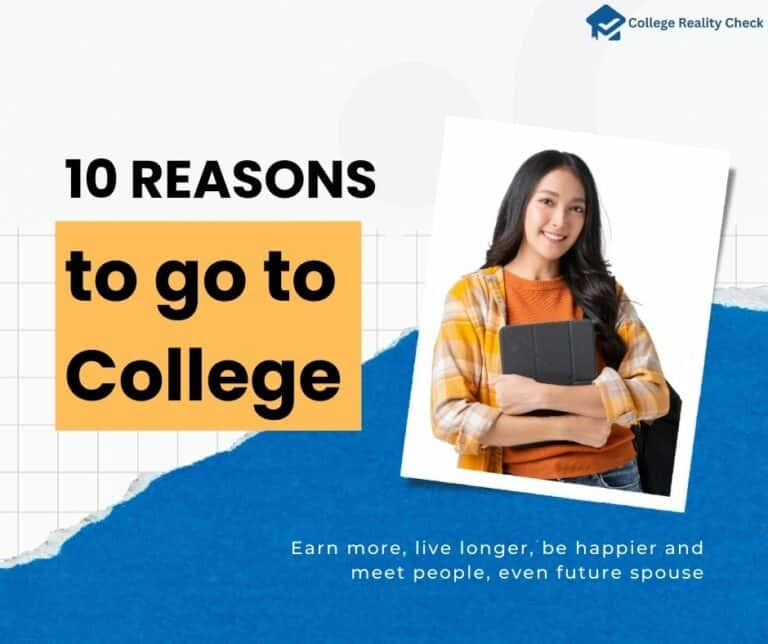Is College the Key to Success for Everyone? Things Have Changed in 2024
College — in the eyes of many, it sits between high school and the labor force.
At some point in the past couple of decades, people thought that one needed a college degree to attain professional success, resulting in many seeking four-year degrees.
According to the National Center for Education Statistics (NCES), degree-granting American institutions conferred over two million bachelor’s degrees in 2022.
In 1990, they conferred less than half a million of those.
It proves that more people today than before believe that going to college is vital.
But is college for everyone?
College isn’t for everyone!
Such is true despite it being seen natural after graduating from high school and before entering the workforce — while a college degree may be advantageous for some, it may be useless for others.
Not all fields out there look for candidates who went to college.
In fact, Higher Ed Dive reports that 45% plan to get rid of bachelor’s degree requirements for some positions!
With so many job opportunities available for non-college degree holders these days, it’s critical now more than ever to determine whether or not college is for you before you make a move.

Weighing the Pros and Cons of College
Many dream of having a college degree, but their budget and low GPAs are in the way.
Meanwhile, some individuals who just got their high school diploma want to join the workforce or start their own business, but their parents pressure them to go to college instead.
Considering the various advantages of a college degree, it’s plain to see it’s a marvelous thing!
But then, it doesn’t come without any downsides.
It’s a must to consider the pros and cons of going to college equally to know if having an undergraduate degree is right for you despite the fact that college is not for everyone.
Advantages of a College Degree
Let’s talk about the top positives associated with being a bachelor’s degree holder.
- Greater job opportunities. According to Northeastern University, individuals with a college degree enjoy 57% more job opportunities than peers without a college degree.
- Higher earning potential. Men and women with bachelor’s degrees earn about $900,000 and $630,000 (respectively) more in median lifetime earnings than high school graduates.
- Advanced knowledge and skills. College equips individuals with important knowledge and skills vital for their careers, thus making them valuable assets to their employers.
- Personal growth and satisfaction. It’s not just academic learning that college offers but also meeting new people, exploring various interests, and obtaining valuable life skills and experience.
Disadvantages of a College Degree
To keep this post from being one-sided, let’s also discuss the cons of college.
- Expensive. The steep cost of college is the number one reason why many high school graduates in the US refrain from pursuing an undergraduate degree, Money says.
- Student debt. More than 43 million Americans have federal student loan debt, each borrower owing the government an average of $37,330 — it generally takes around 20 years to pay off the amount.
- Time commitment. Another reason why college is not for everyone is it can be challenging for some to balance various commitments, from work to family, with their studies.
- Success is not guaranteed. Think again if you believe a college degree assures a successful career — in the US, around 53% of recent college graduates are either underemployed or unemployed.

Determining Whether College is Right or Not
Apply to college or apply for a job?
Such is a question that pops into the minds of graduating high school students who have yet to make up their minds about whether a college degree should be next after their high school diploma.
Figuring out if going to college is the right step is a complicated task.
It’s because there are various factors to consider, from your career goal to your finances — failure to factor in all crucial matters could result in you dropping out of college or regretting not going to college at all.
- Identify your career goal. Is a college degree necessary to land the job of your dreams? Determine if enrolling in a bachelor’s degree program is a worthy investment.
- Consider your financial situation. Look into the cost of tuition, books, and other college-related expenses and determine whether or not you might end up paying off educational debt for years.
- Identify the type of learner you are. Not all individuals who want to learn something thrive in a structured environment like a college campus — so, are you one of them?
- Verify your support system. You may struggle with attaining college success if none of your family and friends can help you navigate the challenging course toward an undergraduate degree.
Alternative Paths to Professional Success
By now, we have established why college isn’t for everyone.
Some people may have a prestigious degree from top-tier universities and still feel no satisfaction in their careers, while others may be reaping success even with a high school diploma being their highest credential.
Are you certain that college is not for you or do you want to figure it out some other time?
Perhaps it’s a good idea to consider pathways to success other than enrolling in a four-year degree program.
The future of work won’t be about degrees. More and more, it’ll be about skills. And no one school, whether it be Harvard, General Assembly, or Udacity, can ever insulate us from the unpredictability of technological progression and disruption.
Stephane Kasriel, Upwork CEO
Self-Directed Education Online
Whether you need a piece of paper as proof or just the assurance you have the necessary proficiencies, the internet allows you to obtain knowledge and skills you feel necessary for your success.
In some instances, watching tutorial videos or reading instructional e-books may be enough.
It may be better to go for a more formalized form of online learning at times.
Anything from coding bootcamps to massive open online courses (MOOCs) serves as alternatives to a college degree, and some individuals may find them more rewarding than a bachelor’s degree.
Learning the Necessary Skills
Learning institutions providing specific vocational training in various skilled trades are trade schools.
Their academic programs prepare students for careers such as:
- Auto mechanic
- Construction manager
- Electrician
- HVAC technician
- Paralegal
- Pharmacy technician
- Plumber
- Welder
Most trade school programs take three months to a year to complete.
The cost of attending one can range from $5,000 to $15,000.
Spending Less Time and Money for a Degree
Why college isn’t for everyone is a question that makes even more sense if we make it more specific, such as by wondering why a four-year college isn’t for every person.
Community colleges offer shorter and cheaper degrees.
Whether it’s the cost or time that makes college sound daunting, you may give a two-year institution a try to get a sense of what it’s like to pursue higher education.
Just in case you end up loving it, you may transfer to a four-year institution after earning an associate degree.
Getting Real-Life Experience
In some instances, experience may be just as impressive as a college degree.
Gaining work experience shows prospective employers that you can make it even without attending college, which demonstrates valuable skills such as perseverance, discipline, and problem-solving.
It also shows that you can do the job without additional costly training.
Industry experience assures employers that you have tangible assets instead of theoretical knowledge which may cause some college graduates to struggle when it’s time to immerse themselves in real-life scenarios.
Disclaimer: The views and opinions expressed in this article are those of the authors and do not necessarily represent those of the College Reality Check.





